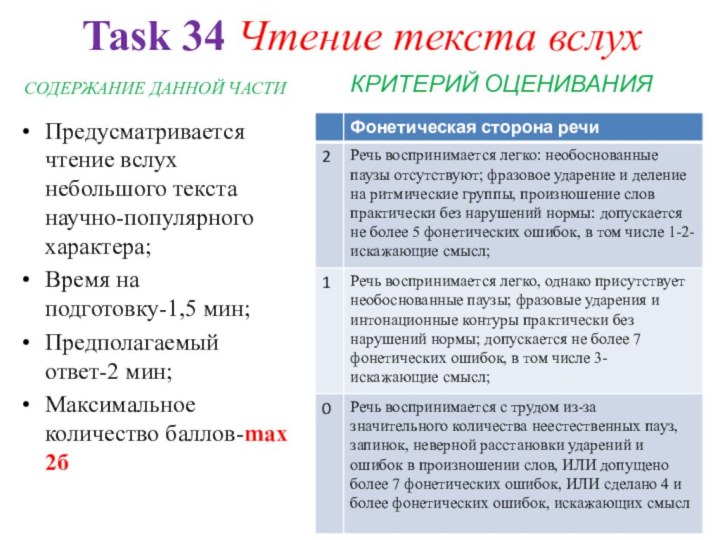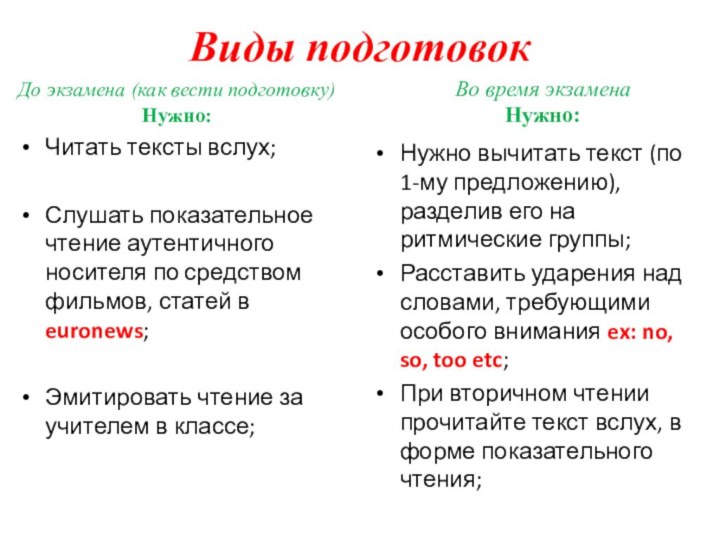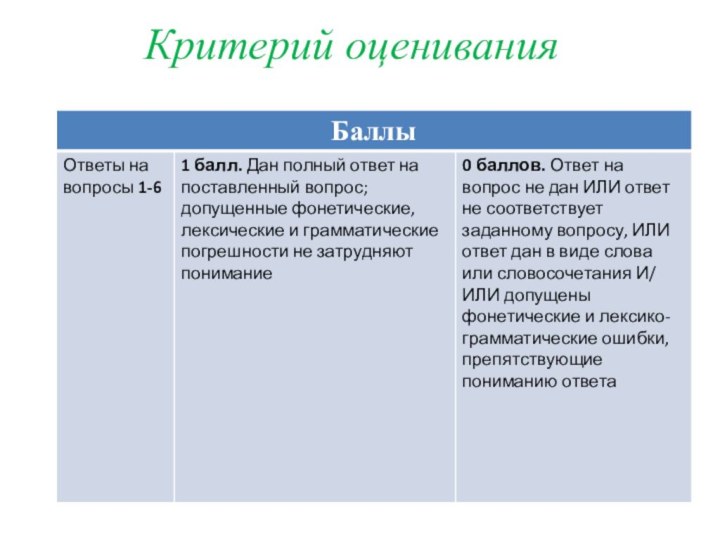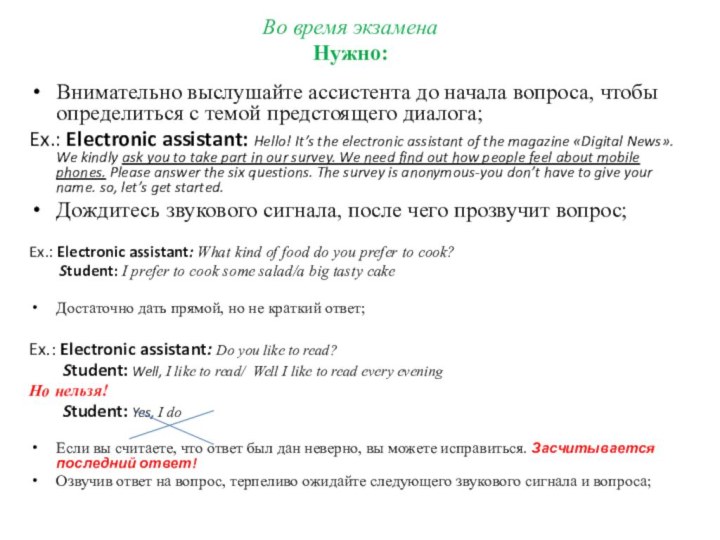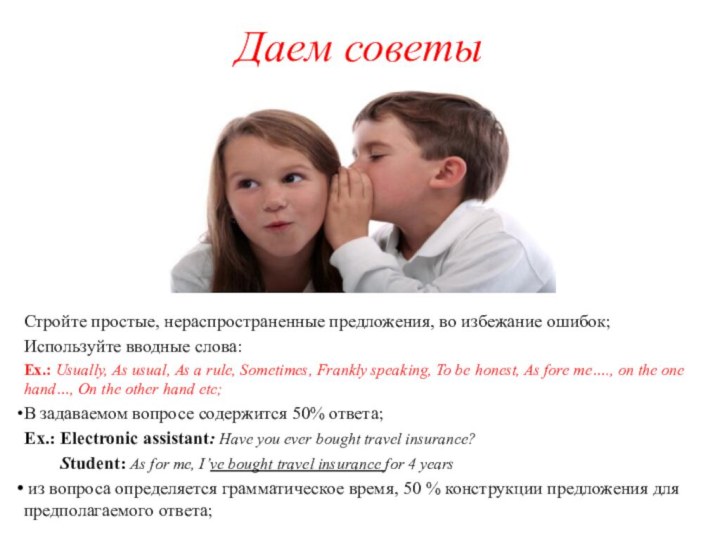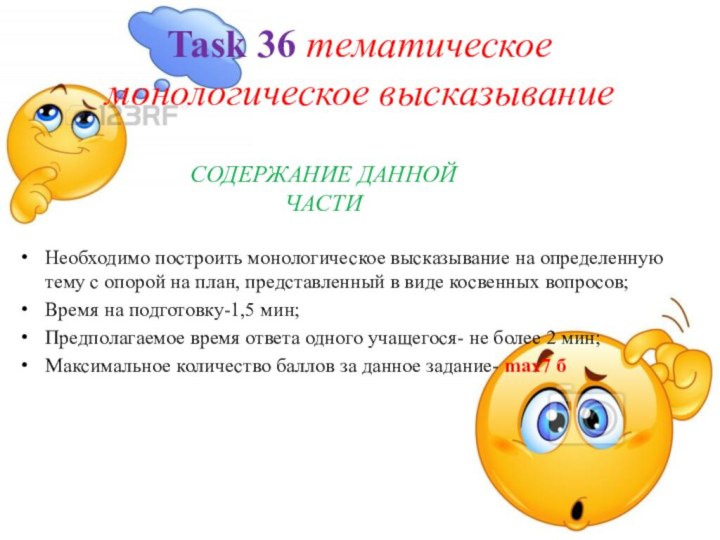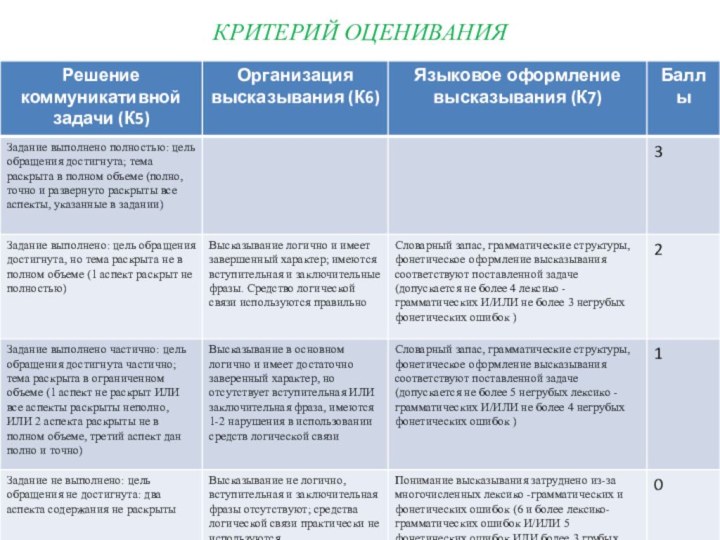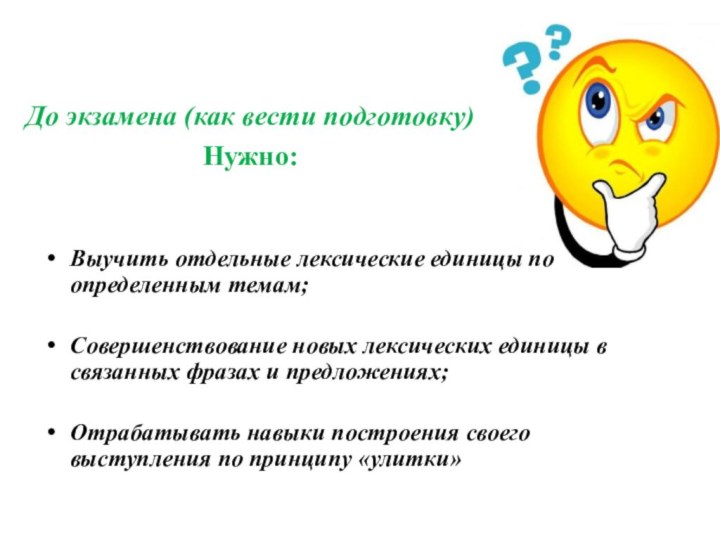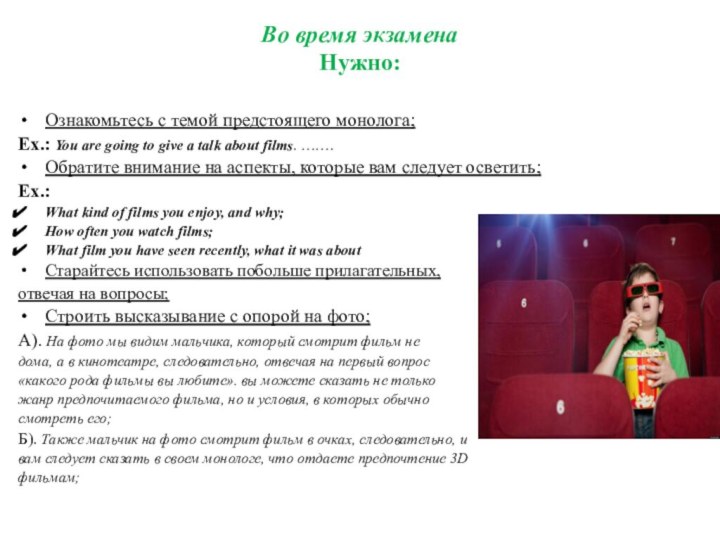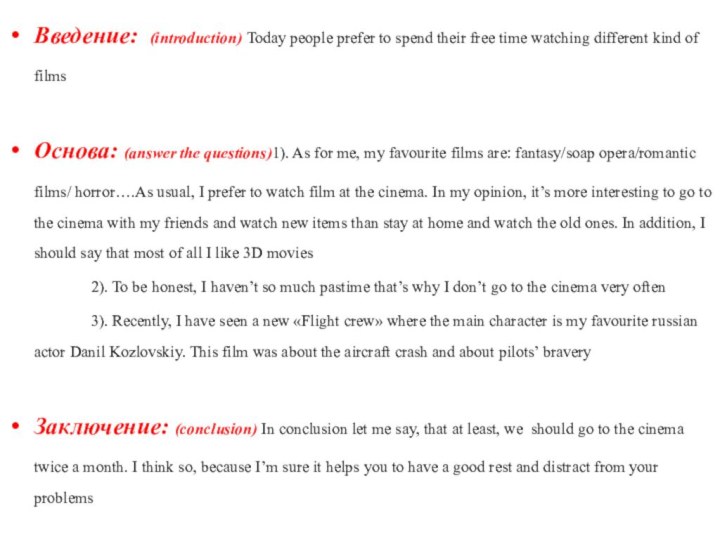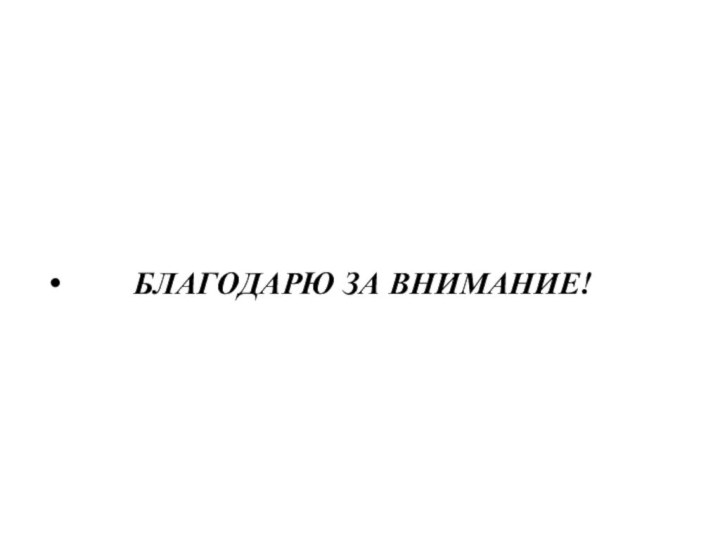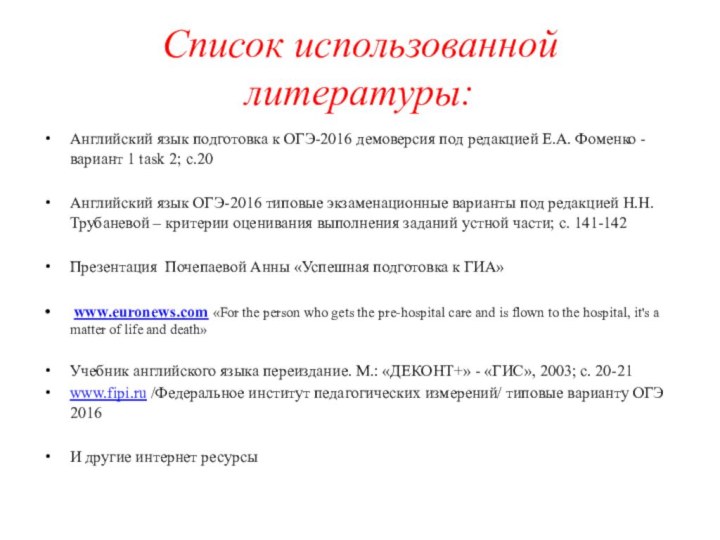Слайд 2
Task 34 Чтение текста вслух
СОДЕРЖАНИЕ ДАННОЙ ЧАСТИ
Предусматривается чтение
вслух небольшого текста научно-популярного характера;
Время на подготовку-1,5 мин;
Предполагаемый ответ-2
мин;
Максимальное количество баллов-max 2б
КРИТЕРИЙ ОЦЕНИВАНИЯ
Слайд 3
Виды подготовок
До экзамена (как вести подготовку)
Нужно:
Читать тексты вслух;
Слушать
показательное чтение аутентичного носителя по средством фильмов, статей в
euronews;
Эмитировать чтение за учителем в классе;
Во время экзамена
Нужно:
Нужно вычитать текст (по 1-му предложению), разделив его на ритмические группы;
Расставить ударения над словами, требующими особого внимания ex: no, so, too etc;
При вторичном чтении прочитайте текст вслух, в форме показательного чтения;
Слайд 4
Даем советы!!!
Повествовательные предложения требуют нисходящей интонации в конце
предложения;
Общие вопросы требуют восходящей интонации;
ex.: a). Do you like
the same weather?
b). Did you go to your grandmother?
Но!
3. Специальные вопросы требуют наоборот нисходящей интонации и выделение непосредственно вопросительного слова;
ex.: a). Where are you going to go?
b). Why do you like the same weather?
c). Why you are so sad?
d). Who is you favourite actor?
Слайд 5
"For the person who gets the pre-hospital care
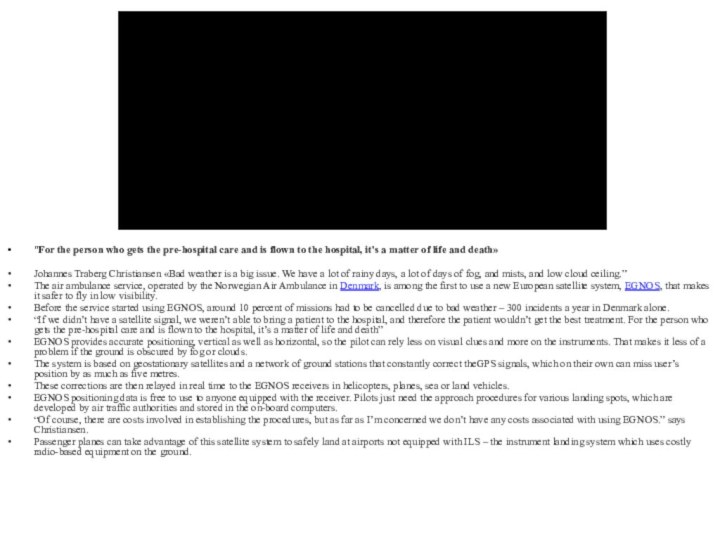
and is flown to the hospital, it's a matter
of life and death»
Johannes Traberg Christiansen «Bad weather is a big issue. We have a lot of rainy days, a lot of days of fog, and mists, and low cloud ceiling.”
The air ambulance service, operated by the Norwegian Air Ambulance in Denmark, is among the first to use a new European satellite system, EGNOS, that makes it safer to fly in low visibility.
Before the service started using EGNOS, around 10 percent of missions had to be cancelled due to bad weather – 300 incidents a year in Denmark alone.
“If we didn’t have a satellite signal, we weren’t able to bring a patient to the hospital, and therefore the patient wouldn’t get the best treatment. For the person who gets the pre-hospital care and is flown to the hospital, it’s a matter of life and death”
EGNOS provides accurate positioning, vertical as well as horizontal, so the pilot can rely less on visual clues and more on the instruments. That makes it less of a problem if the ground is obscured by fog or clouds.
The system is based on geostationary satellites and a network of ground stations that constantly correct theGPS signals, which on their own can miss user’s position by as much as five metres.
These corrections are then relayed in real time to the EGNOS receivers in helicopters, planes, sea or land vehicles.
EGNOS positioning data is free to use to anyone equipped with the receiver. Pilots just need the approach procedures for various landing spots, which are developed by air traffic authorities and stored in the on-board computers.
“Of course, there are costs involved in establishing the procedures, but as far as I’m concerned we don’t have any costs associated with using EGNOS.” says Christiansen.
Passenger planes can take advantage of this satellite system to safely land at airports not equipped with ILS – the instrument landing system which uses costly radio-based equipment on the ground.
Слайд 6
Task 35 диалог-расспрос
СОДЕРЖАНИЕ ДАННОЙ ЧАСТИ
Условный диалог-расспрос с
опорой на услышанные в аудиозаписи вопросы телефонного опроса;
Время
на подготовку-1,5 мин;
Предполагаемый ответ на каждый из шести вопросов-1 мин;
Максимальное количество баллов-max 6б
Слайд 8
Во время экзамена
Нужно:
Внимательно выслушайте ассистента до начала
вопроса, чтобы определиться с темой предстоящего диалога;
Ex.: Electronic assistant:
Hello! It’s the electronic assistant of the magazine «Digital News». We kindly ask you to take part in our survey. We need find out how people feel about mobile phones. Please answer the six questions. The survey is anonymous-you don’t have to give your name. so, let’s get started.
Дождитесь звукового сигнала, после чего прозвучит вопрос;
Ex.: Electronic assistant: What kind of food do you prefer to cook?
Student: I prefer to cook some salad/a big tasty cake
Достаточно дать прямой, но не краткий ответ;
Ex.: Electronic assistant: Do you like to read?
Student: Well, I like to read/ Well I like to read every evening
Но нельзя!
Student: Yes, I do
Если вы считаете, что ответ был дан неверно, вы можете исправиться. Засчитывается последний ответ!
Озвучив ответ на вопрос, терпеливо ожидайте следующего звукового сигнала и вопроса;
Слайд 9
Даем советы
Стройте простые, нераспространенные предложения, во избежание ошибок;
Используйте
вводные слова:
Ex.: Usually, As usual, As a rule, Sometimes,
Frankly speaking, To be honest, As fore me…., on the one hand…, On the other hand etc;
В задаваемом вопросе содержится 50% ответа;
Ex.: Electronic assistant: Have you ever bought travel insurance?
Student: As for me, I’ve bought travel insurance for 4 years
из вопроса определяется грамматическое время, 50 % конструкции предложения для предполагаемого ответа;
Слайд 10
Task 36 тематическое монологическое высказывание
СОДЕРЖАНИЕ ДАННОЙ ЧАСТИ
Необходимо построить
монологическое высказывание на определенную тему с опорой на план,
представленный в виде косвенных вопросов;
Время на подготовку-1,5 мин;
Предполагаемое время ответа одного учащегося- не более 2 мин;
Максимальное количество баллов за данное задание- max7 б
Слайд 12
До экзамена (как вести подготовку)
Нужно:
Выучить отдельные лексические единицы
по определенным темам;
Совершенствование новых лексических единицы в связанных фразах
и предложениях;
Отрабатывать навыки построения своего выступления по принципу «улитки»
Слайд 13
Во время экзамена
Нужно:
Ознакомьтесь с темой предстоящего монолога;
Ex.:
You are going to give a talk about films.
…….
Обратите внимание на аспекты, которые вам следует осветить;
Ex.:
What kind of films you enjoy, and why;
How often you watch films;
What film you have seen recently, what it was about
Старайтесь использовать побольше прилагательных,
отвечая на вопросы;
Строить высказывание с опорой на фото;
А). На фото мы видим мальчика, который смотрит фильм не
дома, а в кинотеатре, следовательно, отвечая на первый вопрос
«какого рода фильмы вы любите». вы можете сказать не только
жанр предпочитаемого фильма, но и условия, в которых обычно
смотреть его;
Б). Также мальчик на фото смотрит фильм в очках, следовательно, и
вам следует сказать в своем монологе, что отдаете предпочтение 3D
фильмам;
Слайд 14
Введение: (introduction) Today people prefer to spend their
free time watching different kind of films
Основа: (answer the
questions)1). As for me, my favourite films are: fantasy/soap opera/romantic films/ horror….As usual, I prefer to watch film at the cinema. In my opinion, it’s more interesting to go to the cinema with my friends and watch new items than stay at home and watch the old ones. In addition, I should say that most of all I like 3D movies
2). To be honest, I haven’t so much pastime that’s why I don’t go to the cinema very often
3). Recently, I have seen a new «Flight crew» where the main character is my favourite russian actor Danil Kozlovskiy. This film was about the aircraft crash and about pilots’ bravery
Заключение: (conclusion) In conclusion let me say, that at least, we should go to the cinema twice a month. I think so, because I’m sure it helps you to have a good rest and distract from your problems

